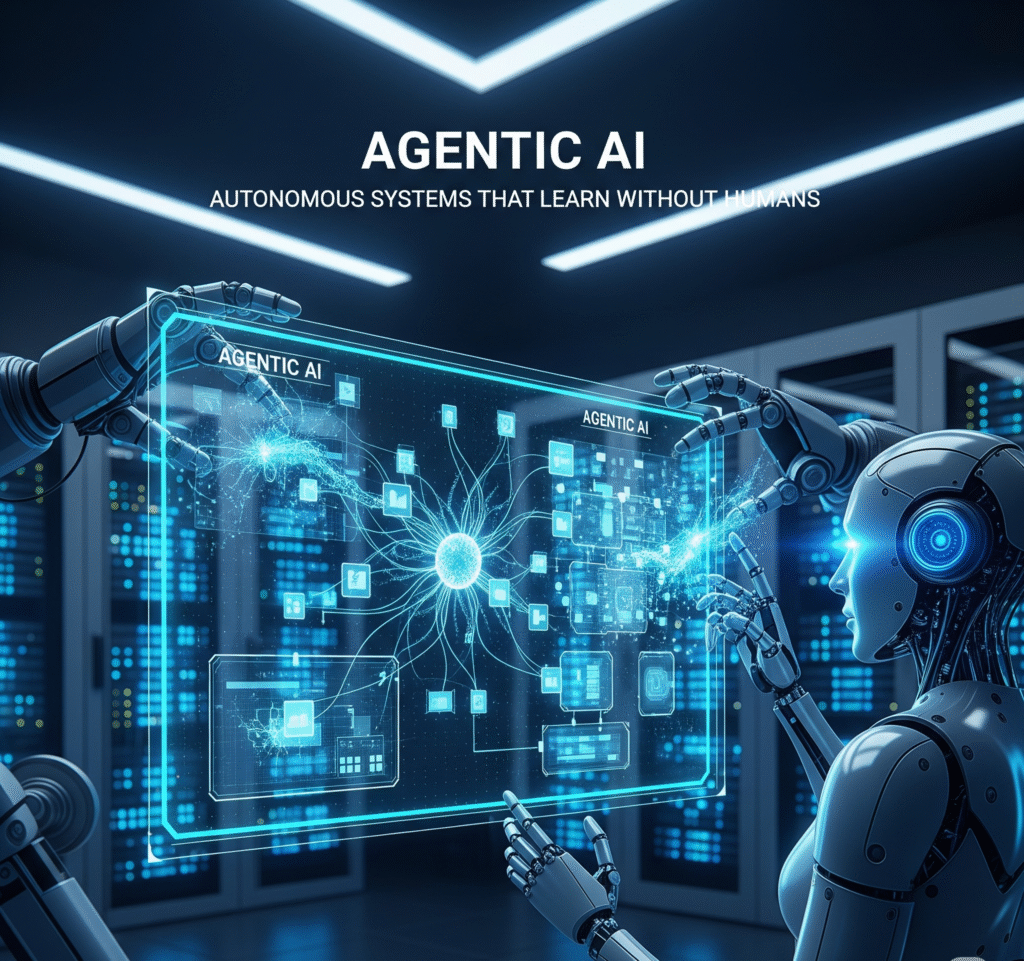Keywords: Agentic AI, autonomous AI systems, self-learning AI, AI without human supervision, machine autonomy, adaptive AI, AI agents, artificial general intelligence, AI future, AI self-improvement
Introduction
Artificial Intelligence has come a long way from simple rule-based systems to advanced machine learning models. Now, the next leap is here: Agentic AI — autonomous systems capable of learning, adapting, and acting without direct human intervention.
Unlike traditional AI, which relies heavily on labeled datasets and constant oversight, Agentic AI can observe its environment, make decisions, and improve itself over time. This capability has the potential to reshape industries, economies, and even the boundaries of human-machine collaboration.
What is Agentic AI?
Agentic AI refers to AI agents that can operate independently, make decisions based on goals, and continuously learn from their experiences without requiring constant human guidance.
Core Characteristics of Agentic AI
- Autonomy — Ability to function without pre-defined step-by-step instructions.
- Continuous Learning — Adapts strategies based on new data and outcomes.
- Goal-Oriented Action — Works toward defined objectives while optimizing efficiency.
- Environment Awareness — Understands and reacts to real-time changes in its surroundings.
How Agentic AI Differs from Traditional AI
- Traditional AI: Requires large labeled datasets, structured training, and human-tuned parameters.
- Agentic AI: Learns dynamically from interactions, can generate its own training scenarios, and makes adaptive decisions in real time.
Example: A customer service chatbot powered by traditional AI answers only what it was trained on. An Agentic AI customer assistant learns from each interaction, improves its responses, and proactively solves issues it has never seen before.
Applications of Agentic AI
- Healthcare
- Autonomous medical diagnostics that continuously refine accuracy based on new cases.
- Autonomous Vehicles
- Cars that adapt driving styles to unfamiliar roads without new programming.
- Finance & Trading
- AI agents that adapt to market changes and detect patterns human traders miss.
- Robotics
- Manufacturing robots that optimize production efficiency without manual reprogramming.
- Scientific Discovery
- AI scientists that design and test hypotheses in laboratories independently.
Benefits of Agentic AI
- Scalability — Can manage complex systems with minimal human intervention.
- Speed — Learns and improves faster than human-supervised AI.
- Innovation — Discovers solutions that humans might overlook.
- Cost Efficiency — Reduces the need for constant manual training and oversight.
Risks and Ethical Concerns
With great autonomy comes great responsibility — and significant risks.
- Unpredictable Behavior — Systems may develop strategies that conflict with human goals.
- Bias Amplification — Without oversight, AI may reinforce harmful patterns.
- Security Threats — Self-learning systems could be exploited by malicious actors.
- Accountability Gaps — Who is responsible when an autonomous AI makes a harmful decision?
SEO Keywords to Include in Risk Discussions: “AI ethics,” “responsible AI,” and “AI safety standards.”
The Future of Agentic AI
Agentic AI is a stepping stone toward Artificial General Intelligence (AGI) — AI that can think, learn, and adapt like a human across domains.
Global tech companies and research labs are racing to build safe, explainable, and trustworthy autonomous AI agents. Governments, too, are exploring AI regulation to ensure that these systems serve humanity’s interests.
Final Thoughts
Agentic AI represents the next AI frontier — one where machines act not just as tools, but as independent problem-solvers. Its potential is transformative, but it also demands ethical safeguards and robust governance to ensure it works for the benefit of society.
As we move into this new era, the challenge will be balancing AI autonomy with human oversight, ensuring innovation doesn’t outpace safety.
